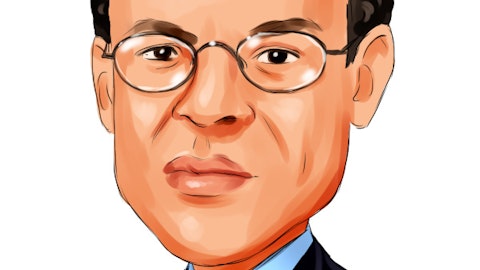Douglas Schirle : Yes, that does kind of answer the two implications there. That Gemini-2 will be a compelling competitor and depending on how you’re able to benchmark or how much tooling and rendering it requires to via IP or via that chip directly, but that it will. Yes, essentially, at 16-nanometers, the competing toe-to-toe or you mean clearly out competing in a lot of these 5-nanometer leading high-performance chips.
Didier Lasserre : If you recall, Gemini-I, the benchmarking we’ve done in the past have been very positive against what’s out there today. Now with Gemini-II, as we discussed in the past, it has 10x of performance and 8x the L1 memory on chip. So it’s certainly going to be something that’s going to be very compelling for the market.
Operator: Our next question comes from George Gasper, an investor.
Unidentified Analyst: Could you go into a little additional information for us on the military and defense applications and the interconnect that the company has had in Israel over the years, in fact, initially the whole Gemini approach came out of there? And considering what’s going on in space, is there broader applications for the advancements that you’re making going into space? And is what’s happening with Israel right now in terms of this situation in the Middle East. Is there — are you seeing anything happen that could create a more military-related effort?
Didier Lasserre : Okay. So I’m going to try and get all those questions now. So let’s start with the military. So yes, there are a lot of different possible use cases with the military, which is also why we’ve had some successes recently with these SBIR that we’ve been filing. So some of the interest that we’ve seen have — from like we’ll call the mill arrow kind of area is certainly SAR for sure. Object detection, is another automatic target recognition, another. We’ve also been for imaging as well for change detection. Just — and also one of the customers that we’re engaged with, in fact, they have two of our servers on loan that they’re doing demonstrations with is they want to start putting data centers in space. And so that’s another — just a standard data center application in space.
And so that’s another one. As far as I’m not sure what the Israel site. So as you say, this original technology was an acquisition we made, and the company was out of Israel. But I’m not sure what the question was revolving around that acquisition.
Unidentified Analyst: Well, basically, just as a reference, I mentioned it. But considering what’s going on in the Middle East right now and the connections that the company has had with Israel, I would think that there would be an attempt to try to get some applications moving forward to — give Israel a more recognition in how they’re trying to monitor things. Is that…?
Didier Lasserre : Yes. So we’ve had some discussions, obviously, with fat that we’ve talked about in the past and other entities there on several applications. I won’t go to exact detail, but there’s certainly — I’m sure we’ll — there will — certain areas that we’ve talked about with them will, most likely get accelerated now because of obviously what’s happening now. But right now, we’re not having those discussions right now. There’s more pressing issues in Israel right now.
Unidentified Analyst: I see. Okay. Well, it looks like you’re about to make some generally movements forward with Gemini-II going to III. Hopefully, this really starts to turn the company around in terms of its revenue volume and would expect that by the end of this fiscal year. There’s some real momentum going forward. Can you comment on it?
Didier Lasserre : Yes. There’s certainly momentum. And as time goes on, we hope to announce more traction. But the end of the fiscal year, any revenue that comes will be coming from Gemini-I. So as we’ve discussed, Gemini-II, we’re not going to be even sampling it until summer of next year. And so that falls into fiscal ’25.



